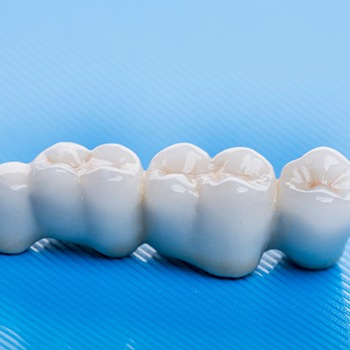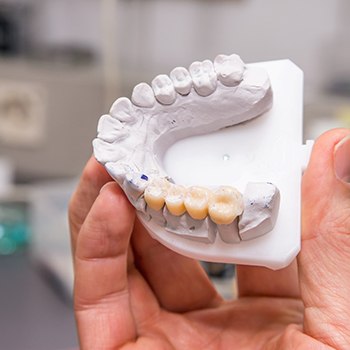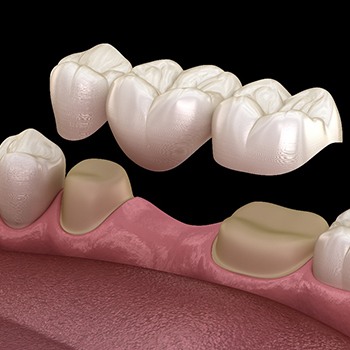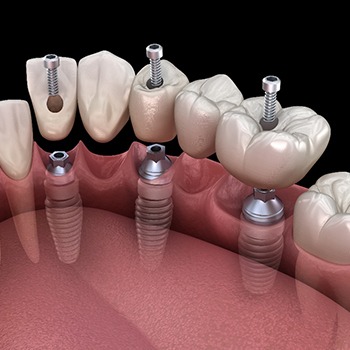Dental Bridges – Dallas, TX
Quickly Ridding Your Smile of Gaps

As you may already know, losing even one tooth can do a lot of damage. Going without a chomper will worsen your looks, oral health, and general quality of life. So, it’s only natural that lacking some adjacent teeth is an even worse mouth problem. The good news is that you can address this issue with quality dental bridges here in Dallas! To learn more about them, just keep reading or book a consultation today.
What is a Dental Bridge?

A dental bridge is a fixed restoration that “bridges” large gaps left by tooth loss. In terms of makeup, each consists of dental materials fused to either side of a pontic (i.e., an artificial tooth). This design lets the device replace up to four missing teeth at once.
Given the description above, dental bridges suit patients who’ve lost a few adjacent teeth. They allow such patients to restore their entire grins with one appliance. Otherwise, there aren’t many requirements for getting a dental bridge; most adults can qualify for one if they’re in good health.
The Types of Dental Bridges

Before you get a dental bridge, you must consult Dr. Martinez. He’ll look over your smile and check whether the procedure suits you. If he thinks it does, he’ll draft a custom treatment plan just for you.
If our team approves your care, we’ll further consider the kind of dental bridge you should get. We’ll then recommend one of the following types:
Traditional Dental Bridge

The traditional dental bridge is (per its name) the standard dentists use today. In general, it consists of dental crowns fused to the sides of a pontic. That means it relies on nearby natural teeth – “abutments” – to stay in place.
Of the two types of dental bridges, a traditional one is less costly. Its materials and features tend to make it inexpensive compared to an implant bridge. However, placing it does remove some of the abutments’ enamel.
Implant Bridge

Unlike a regular one, an implant bridge relies on dental implants – small titanium posts – instead of dental crowns. Its posts are placed in your jaw’s empty sockets and slowly fuse with bone tissue over time. As a result, the final bridge remains secure very secure and doesn’t move around. It won’t loosen or fall like a standard denture could.
Given how they work, implant bridges don’t alter your existing teeth; a dentist doesn’t “prep” abutments to place them. That said, this type tends to cost more than the standard option.
The Benefits of Getting a Dental Bridge

If you get a dental bridge for your grin, you’ll enjoy several notable perks. These include:
- Lifelike Looks – Today’s dental bridges have porcelain surfaces, so they blend seamlessly with your surrounding teeth. Friends and family won’t even notice you have one.
- A Healthier Smile – Since it fills your smile gaps, a dental bridge reduces the spread of harmful bacteria and stops your other teeth from tilting.
- Easier Eating – As a dental bridge gives you new teeth, it helps you chew certain foods more easily. You won’t struggle as much to have your favorite dishes.
- Lasting Results – The average dental bridge lasts 5-15 years. Meanwhile, well-maintained ones can reach lifespans of 20 years or more!
When your smile loses teeth that once sat side-by-side, a dental bridge is sure to help. Take some time to consider this treatment and schedule a consultation soon.






